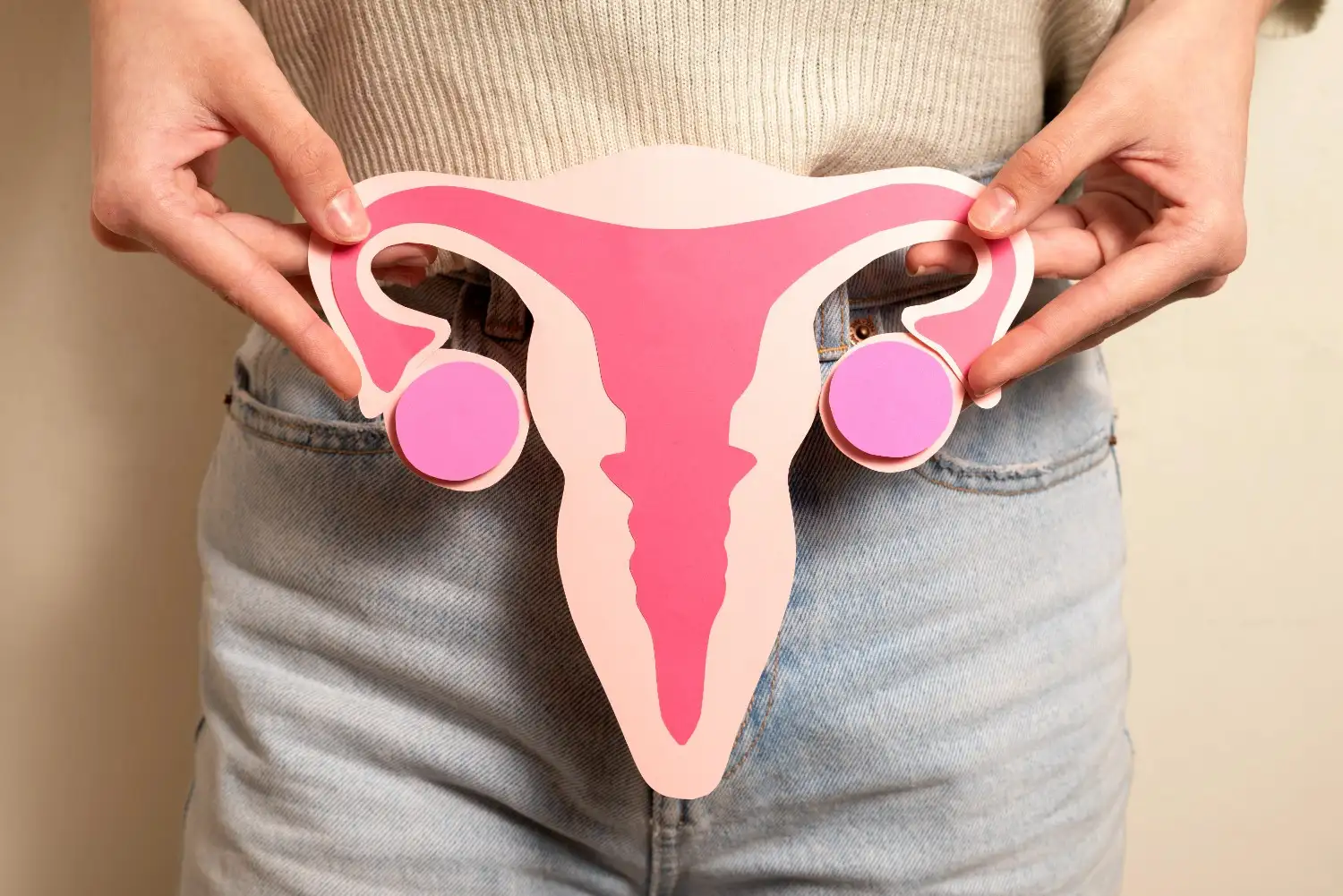Table of Contents
Berberine does not directly increase estrogen. Instead, it helps regulate hormone balance by influencing how the body processes estrogen and androgens.
Research shows its effects are more about restoring balance than raising estrogen levels outright, especially in conditions like PCOS and during menopause.
Key Summary:
-
Berberine doesn’t directly raise estrogen but helps balance hormones.
-
Strong evidence for PCOS, promising for perimenopause support.
-
Its role is metabolic and regulatory, not as a replacement hormone.
-
Safe for most, but caution with hormone-sensitive conditions.
How Berberine Interacts with Estrogen Pathways
 Berberine does not act like estrogen replacement but influences pathways that affect how much estrogen the body produces and uses.
Berberine does not act like estrogen replacement but influences pathways that affect how much estrogen the body produces and uses.
It regulates enzymes, receptors, and hormone conversions, creating a more balanced hormonal profile rather than spiking estrogen levels.
Here’s how it works:
Supports aromatase activity: May increase expression of CYP19a1, the gene that helps convert androgens (like testosterone) into estrogens.
Reduces androgen production: Can block enzymes such as AKR1C3 and CYP17a1, which are involved in making testosterone and other androgens.
Acts on estrogen receptors: Early studies suggest berberine may interact with GPER1, a receptor sensitive to estrogen (1).
- Shifts estrogen metabolism: Encourages the body to produce more protective estrogen metabolites (2-hydroxyestradiol) rather than harmful ones (4-hydroxyestradiol).
Research Findings on Hormonal Balance
In women with polycystic ovary syndrome (PCOS), berberine has been shown to reduce luteinizing hormone (LH) and testosterone while increasing follicle-stimulating hormone (FSH) and progesterone.
This shift improves the LH/FSH ratio, which is important for restoring regular ovulation and fertility.
One study compared berberine with metformin, a common PCOS drug. Berberine not only improved ovulation rates but also appeared to lower androgen levels more effectively in some cases, with fewer digestive side effects (2).
This makes it an attractive option for women struggling with insulin resistance and hormone imbalance.
In animal studies, berberine improved ovarian function and hormone balance in models of PCOS by regulating aromatase and lowering androgen levels (3). These results suggest a multi-layered action on the endocrine system, although more human trials are needed.
For perimenopausal and menopausal women, berberine is being studied for its indirect benefits. While it doesn’t replace lost estrogen, it can improve insulin sensitivity, reduce cholesterol, and support weight management.
Since low estrogen during menopause often triggers metabolic changes, these effects may help women feel more balanced even without directly increasing estrogen.
Does Berberine Raise Estrogen Levels?
No, berberine does not directly raise estrogen levels in the bloodstream. Its effects are indirect, working through enzyme regulation, androgen reduction, and estrogen receptor interactions to promote balance.
This is why researchers describe berberine as a hormone regulator rather than an estrogen booster.
While women with PCOS or low estrogen symptoms may feel improvements in cycles, ovulation, or metabolism, these changes happen because berberine shifts the overall hormone environment.
It is not a substitute for hormone therapy but can be part of a natural approach to restoring balance.
Potential Benefits of Berberine for Women’s Hormones
 Berberine is often studied in women’s health because of its ability to regulate hormones, improve metabolism, and support reproductive function. Its benefits go beyond blood sugar control and may touch several phases of a woman’s life.
Berberine is often studied in women’s health because of its ability to regulate hormones, improve metabolism, and support reproductive function. Its benefits go beyond blood sugar control and may touch several phases of a woman’s life.
PCOS Support and Fertility
In women with polycystic ovary syndrome (PCOS), berberine helps reduce high androgen levels (like testosterone) while improving the LH/FSH ratio.
This hormonal shift supports ovulation, which is often disrupted in PCOS.
Some clinical studies suggest berberine may work as well as, or even better than, metformin for restoring menstrual cycles and improving fertility, with fewer digestive side effects (4).
Menstrual Cycle Regulation
By lowering excess androgens and encouraging better estrogen balance, berberine can help women with irregular cycles.
Improved hormone regulation often leads to more predictable periods, less severe PMS symptoms, and healthier ovarian function.
Perimenopause and Menopause Support
During perimenopause and menopause, falling estrogen can trigger weight gain, hot flashes, and an increased risk for heart disease.
While berberine does not replace estrogen, it may soften these changes by improving insulin sensitivity, reducing cholesterol, and supporting healthy body composition.
This makes the transition into menopause smoother for some women.
Metabolic and Cardiovascular Benefits
Hormonal changes often increase the risk of metabolic syndrome, diabetes, and cardiovascular disease in women.
Berberine supports healthy blood sugar, improves lipid profiles, and reduces inflammation, indirectly protecting long-term hormonal and heart health (5).
Risks and Considerations
Berberine is generally safe when taken in recommended doses, but its effects on hormones and metabolism mean it is not suitable for everyone.
Some points to keep in mind:
Pregnancy and breastfeeding: Berberine should be avoided, as safety has not been established.
Hormone-sensitive conditions: Women with breast, ovarian, or uterine cancer should use caution, since berberine interacts with estrogen pathways.
Drug interactions: Berberine can affect the way the liver processes medications, including statins, diabetes drugs, and Tylenol.
Side effects: Some people experience mild digestive discomfort, constipation, or stomach upset when starting berberine.
Because studies on long-term use are still limited, many experts recommend taking breaks or cycling supplementation rather than using it continuously for years.
Should You Use Berberine for Hormonal Support?
 Berberine may be helpful for women with PCOS, insulin resistance, or metabolic issues, but it should not be seen as a direct estrogen replacement. Its role is more about balancing hormones and improving overall health rather than boosting estrogen levels.
Berberine may be helpful for women with PCOS, insulin resistance, or metabolic issues, but it should not be seen as a direct estrogen replacement. Its role is more about balancing hormones and improving overall health rather than boosting estrogen levels.
If you have PCOS, berberine may restore regular ovulation and lower androgen levels.
For women entering perimenopause, it could help with weight management and insulin sensitivity, which often decline when estrogen levels drop. These indirect benefits make it a valuable tool for hormone balance, even though it is not a hormone therapy.
That said, berberine is not right for everyone. Women with hormone-sensitive cancers, those taking multiple medications, or anyone pregnant or breastfeeding should avoid it unless advised otherwise by a doctor.
For the best results, it’s wise to work with a healthcare provider who can monitor hormone levels, track changes, and adjust your plan as needed.
Final Words
Berberine does not directly increase estrogen, but it helps regulate how the body balances hormones. By reducing excess androgens, improving aromatase activity, and supporting estrogen pathways, it creates a healthier hormonal environment.
Women with PCOS, perimenopause, or metabolic concerns may find it especially useful, though it is not a substitute for hormone replacement therapy.
As research grows, berberine shows promise as a natural option for supporting hormone balance when used carefully and under medical guidance.
FAQs
Does berberine increase estrogen?
No, berberine does not directly raise estrogen levels. Instead, it regulates hormone pathways, reduces androgens, and improves estrogen balance.
Is berberine safe for women with PCOS?
Yes, research shows berberine can help women with PCOS by lowering testosterone, improving ovulation, and balancing hormones. It may work similarly to metformin but with fewer side effects.
Can berberine help with menopause symptoms?
Berberine may help with some metabolic changes linked to menopause, such as weight gain, insulin resistance, and cholesterol, but it does not replace estrogen. Its benefits are more indirect.
Is berberine the same as hormone replacement therapy?
No, berberine is not the same as HRT. It does not supply estrogen but helps regulate how the body processes hormones.
How long does it take to see hormone effects with berberine?
Some women notice changes in cycles or metabolism within 2–3 months. The timeline depends on individual health, dosage, and consistency of use.
Can I take berberine if I’ve had breast cancer?
Caution is advised. Because berberine interacts with estrogen pathways, women with estrogen-sensitive cancers should only use it under medical supervision.



